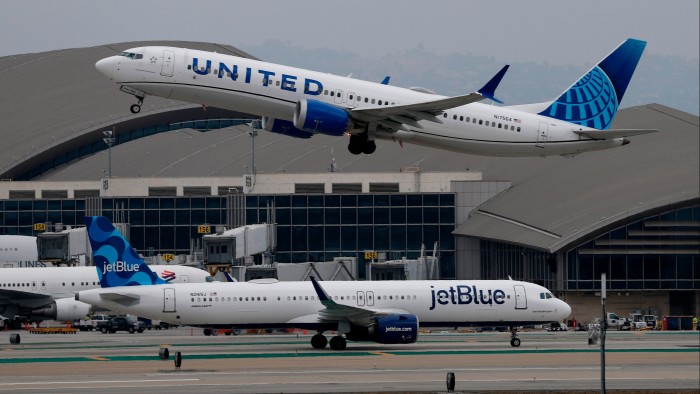Unlock the Editor’s Digest for free
Roula Khalaf, Editor of the FT, selects her favourite stories in this weekly newsletter.
Airlines the world over love forming partnerships. United Airlines and rival US carrier JetBlue announced one last week that gives each something it has craved. History suggests investors — and passengers concerned about upgrades and lounge access — need to check the fine print to see how they benefit.
United and JetBlue plan to sell each other’s flights on their websites through the deal, dubbed Blue Sky. JetBlue’s north-eastern customers get a bigger US network plus worldwide destinations, and the carrier will take some United flight slots at Newark airport. Its new partner, frustrated by problems at the New Jersey hub, will get seven prized daily round-trip slots at JFK, another major New York City airport, plus more Caribbean destinations to offer.
Real mergers between airlines often fall foul of competition rules and national interest in flag carriers, leaving alliances often the only option for expansion. JetBlue knows all about this, having had its $7.6bn Spirit takeover blocked last year on competition grounds. A court killed off a 2020 partnership with American Airlines for similar reasons. Unlike that tie-up, its United alliance will not include co-ordinating flight schedules or revenue sharing.
Partnering also allows airlines to avoid disclosing much financial detail. Australia’s Qantas loudly trumpeted its 2012 tie-up with Emirates, where it offered its partner’s European network via Dubai at a time when jumbo-sized losses were forcing the ailing red roo to cut routes. Yet no figures on the financial outcome ever made its annual reports, and five years later, Qantas had recovered its bounce — and returned to using the more popular Singapore as a stopover for its own London flights.
These alliances also avoid the embarrassment that can come from airlines taking equity stakes in one another, a traditional means of proving commercial commitment for the long haul. One sorry example is Etihad: the Middle Eastern carrier lost more than $1bn through stakes in airlines that subsequently collapsed, from India and the Seychelles to Berlin via Alitalia.
Successful alliances, then, are about laying the least cash while making customers feel better off. Airlines do not always get this right. Frequent flyers usually cannot use their points for upgrades on the partner carrier; lack of reciprocal lounge access can be another annoyance. Last year, however, One World, the alliance linking 15 airlines, said Qantas may let frequent flyers with American use their points to upgrade. That would set a new standard and go some way towards engendering monetisable loyalty.
Investors do not see obvious value in JetBlue and United’s move — their combined market value fell 1 per cent after they announced their tie-up last week. That ignores the fact that there could be some real benefits from the alliance, and that for as long as genuine mergers are off the table, this is as good as it gets.
